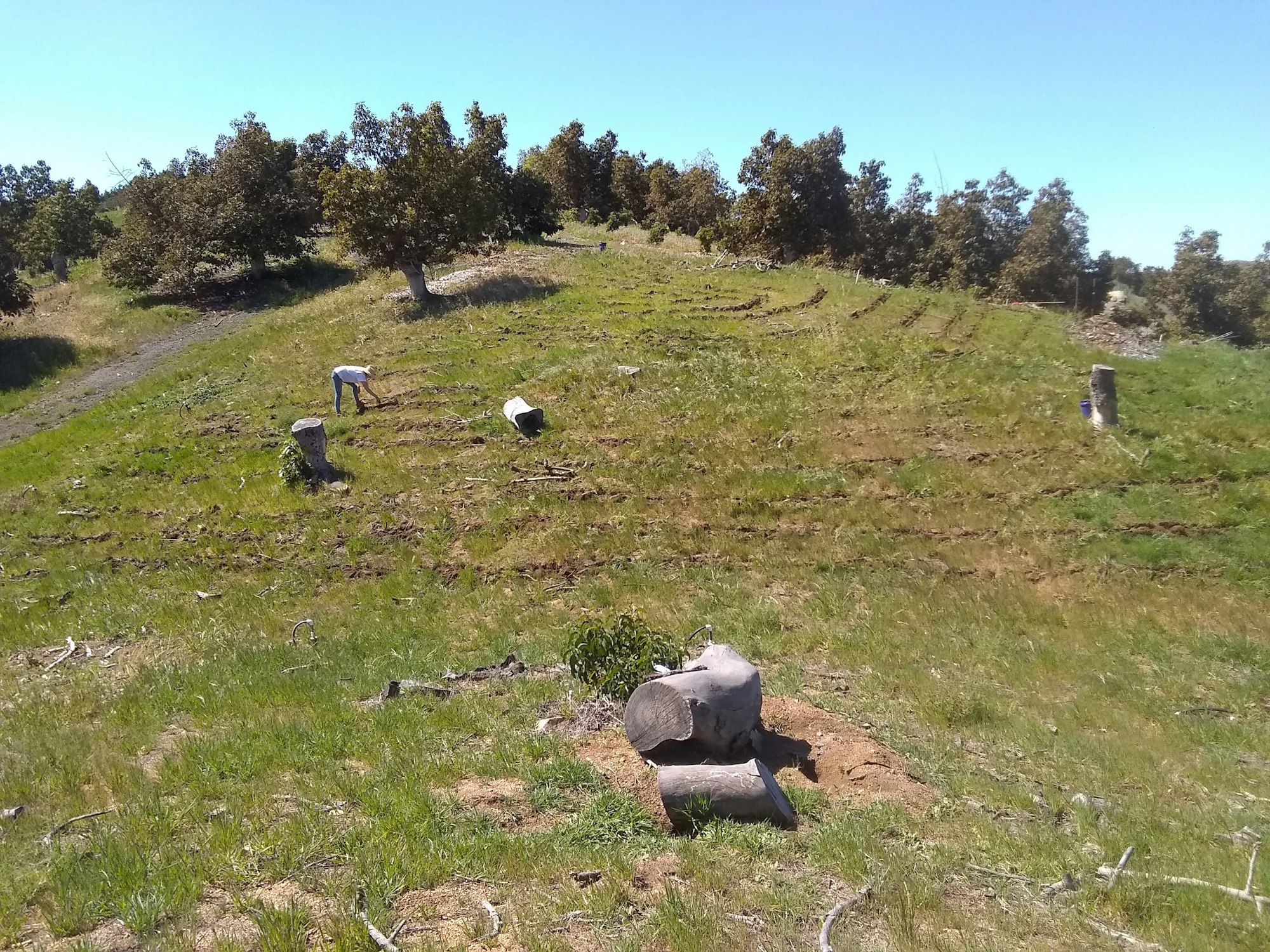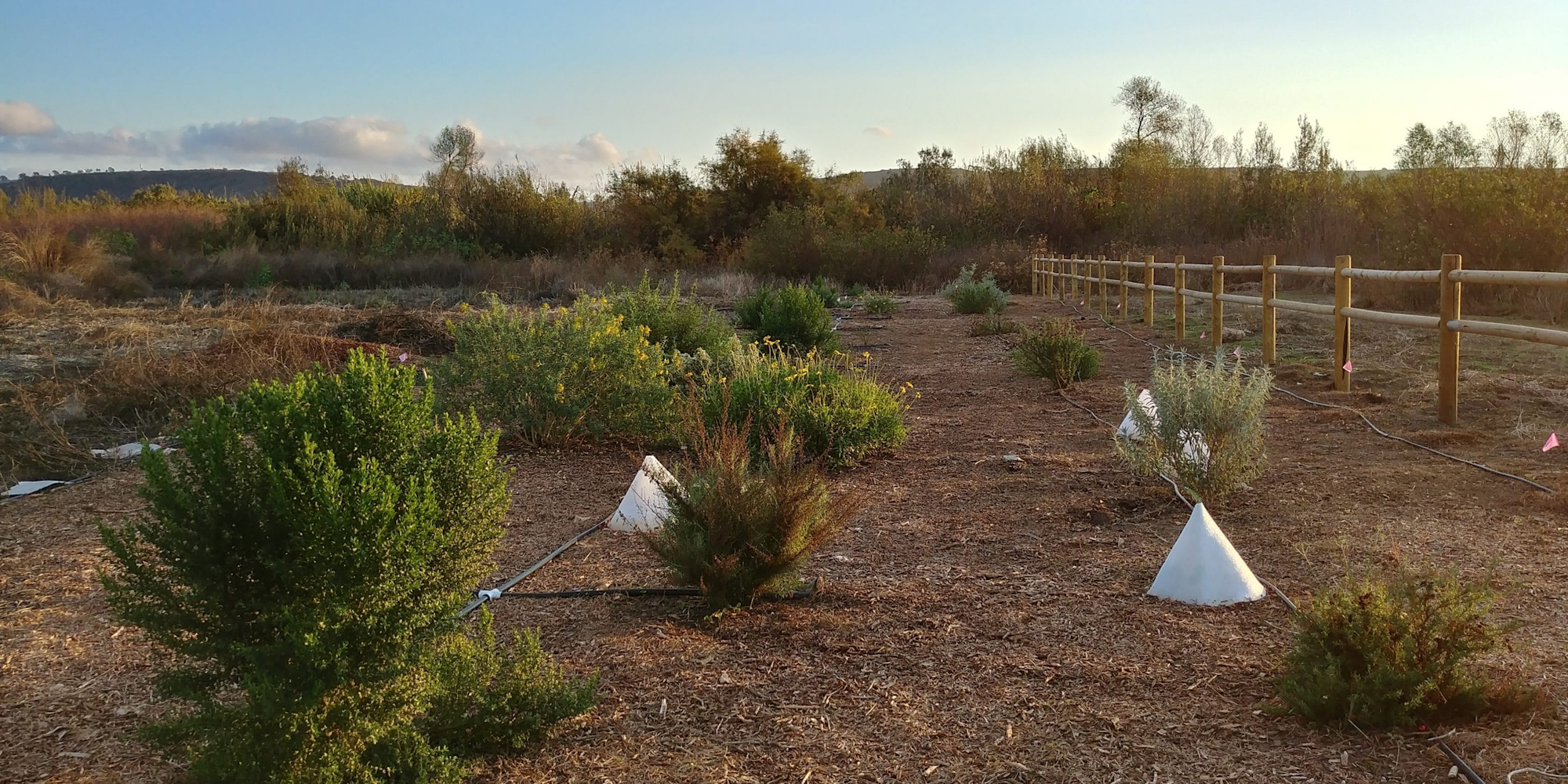Healthy Soils and Carbon Farming Practices
We are working to help farmers and ranchers implement elements of carbon farming on their land, and can help you apply for grants that are available to implement these practices.
Agriculture is one of the world’s largest land uses and can be done in ways that either promote or degrade the land and atmosphere. Farming techniques, such as tilling, use of chemical fertilizer, herbicide and pesticide application, leaving bare soil and over-grazing, actively release carbon held in the soil into the atmosphere at high rates, further increasing the detrimental effects of climate change. However, there are alternative land management practices that can help capture carbon in the soil that have long been practiced by traditional farmers all over the world.
These practices are referred to as regenerative agriculture or carbon farming. Carbon farming practices demonstrate many improvements to soil quality, increased nutrient availability, water infiltration and retention, and increased soil organic matter, which is key to improving many soil functions.. Many of these same benefits help make agricultural soils more resilient to the effects of climate change, like drought and extreme weather. Some of these practices include the application of compost and mulch, planting cover crops, prescribed grazing, tree and shrub planting, and more.
Click the + button next to the different technical assistance and grant funding programs below to learn more!
Program Information
In 2022, we teamed up with Partners for Fish & Wildlife, Earth Discovery Institute, NRCS and Point Blue Conservation to create a program that assists farmers and ranchers with implementing more native pollinator habitat on their working lands using carbon farming principles. If you are interested in learning about the benefits of implementing more pollinator habitat on your working land, check out the Pollinator Habitat Restoration on Working Lands Guide.
Eligibilty and How to Apply
This is an ideal opportunity for producers who:
- Don’t use pesticides, or can commit to stopping
- Are interested in integrated pest management
- Would like to support a more holistic on-farm ecosystem
Interested applicants can receive a free site visit from our field team to assess the quality of habitat on their working land. Visit our program page HERE to learn more and sign up!
Program Information
The State Water Efficiency and Enhancement Program (SWEEP) provides financial assistance in the form of grants to implement irrigation systems that reduce greenhouse gases and save water on California agricultural operations. This is a great opportunity for folks looking to convert to a solar well! Projects are funded up to $200,000.
Eligibility and How to Apply
Interested applicants in our service area can receive a free irrigation evaluation from one of our field technicians to determine eligibility. Applicants must be on a well, and must get a pump test in order to apply. If you farm less than 50 acres and/or are a member of a Socially Disadvantaged Farmer and Rancher demographic link to criteria, you may be eligible to receive a $500 subsidy for your pump test. To sign up for a free irrigation evaluation, first input your farm address into this map to confirm you are in the service areas of RCD of Greater San Diego County or Upper San Luis Rey RCD. If you are, follow this link to sign up. If you are in Mission RCD’s service area, they offer similar services and can support you. Check out their site here.
Common SWEEP projects include:
- Installing soil moisture monitoring, drip systems
- Switching to low pressure irrigation systems
- Pump retrofits
- Variable frequency drives and installation of renewable energy to reduce on-farm water use and energy.
It is important to note that projects are 3 years long and producers must commit to 10 years of the newly implemented component. Applications are accepted once a year, and the application period usually opens each Fall. To stay informed be sure to subscribe to CDFA SWEEP updates here.
Program Information
The National Resource Conservation Service (NRCS) provides financial support for producers who want to implement conservation practices through the Environmental Quality Incentives Program (EQIP). If you have completed your conservation projects through EQIP, you may be eligible for the next tier conservation program called the Conservation Stewardship Program (CSP).
Eligibility and How to Apply
Interested applicants can receive a free site visit from one of our field technicians to determine eligibility. One of the requirements for the application is to have a conservation plan written by the local NRCS staff, who we can help connect you with after the site visit. Email us at ag@rcdsandiego.org to schedule a site visit. For further questions, contact Celine Morales at the Escondido NRCS office. They accept applications throughout the year. Follow this link to apply.
Program Information (Currently Closed, Check Back)
The Healthy Soils Program (HSP) stems from the California Healthy Soils Initiative, a collaboration of state agencies and departments tasked with promoting the development of healthy soils on California’s farmlands and ranch lands. The HSP has two components: the HSP Incentives Program and the HSP Demonstration Projects.
We are partnering with Zero Foodprint, who recieved a block grant for the program to provide direct funding to producers in San Diego County. The Healthy Soils Program provides financial assistance for implementation of conservation management that improves soil health, sequesters carbon and reduces greenhouse gas (GHG) emissions. This is a great option for farmers and ranchers who are looking to try something new, as the grant will not fund a practice previously applied on their operation. Projects are funded up to $100,000.
Eligibility and How to Apply
Interested applicants can receive a free site visit from one of our field technicians to determine eligibility. To learn more please contact our Agricultural Programs Coordinator Elizabeth Garcia at elizabeth.garcia@rcdsandiego.org or 619-562-0096 x 202.
It is important to note that projects are 3 years long, with a yearly application of the practice(s), and producers must commit to up to 3 years of monitoring after the grant term ends. To stay informed, be sure to subscribe to CDFA HSP updates here.
To learn more about the CDFA Healthy Soils Program, you can read an interview with Belinda Xu, a HSP grant recipient.









